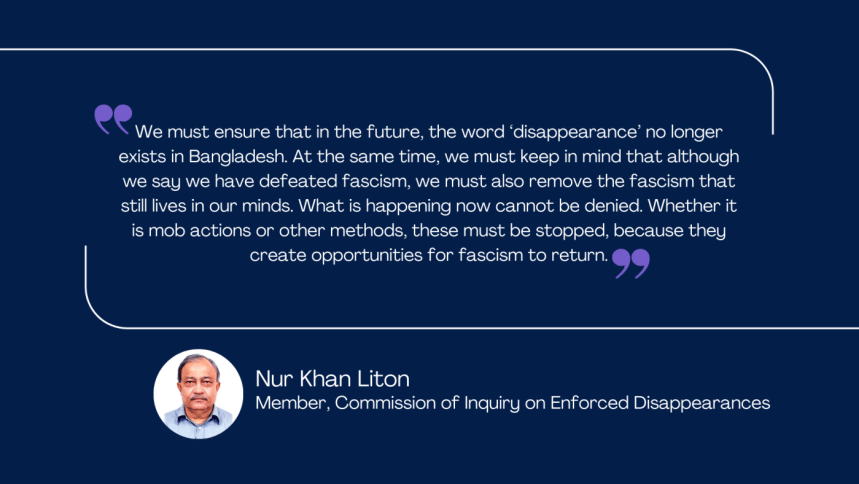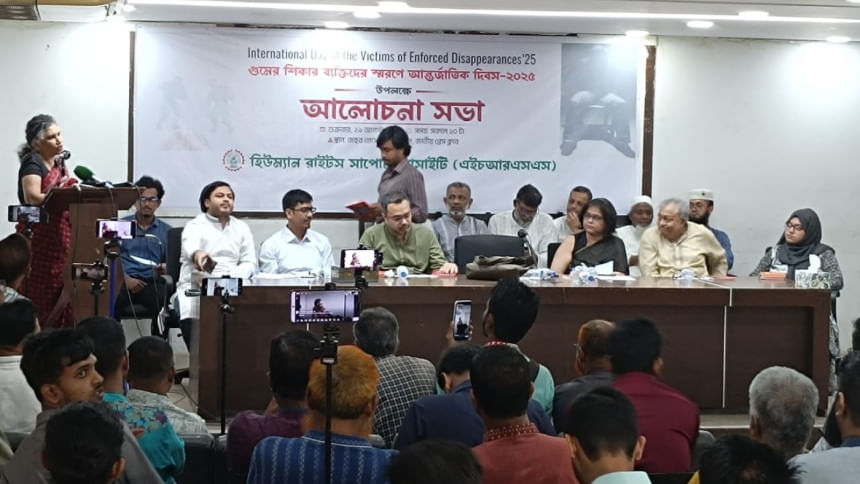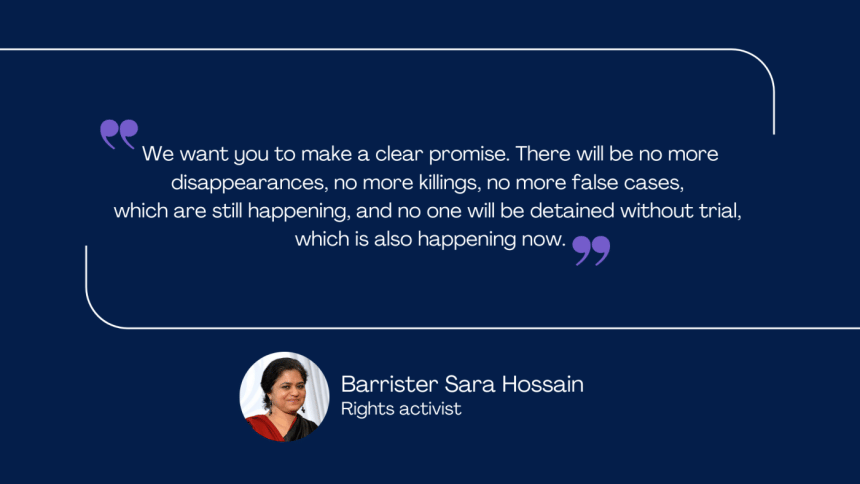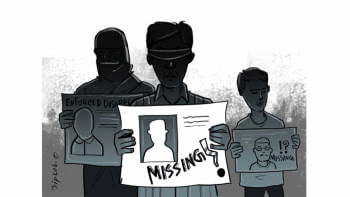No more enforced disappearances: HRSS places seven demands

Human Rights Support Society (HRSS) today presented seven demands, including a call for Bangladesh to fully implement the International Convention for the Protection of All Persons from Enforced Disappearance.
HRSS Secretary General Muniruzzaman announced the demands at a discussion held at the National Press Club in Dhaka on the eve of the International Day of the Victims of Enforced Disappearance.

One of the key demands is that the families of missing persons must be informed as quickly as possible about their relatives' whereabouts. Each incident of enforced disappearance must be properly investigated, and the perpetrators brought to justice with exemplary punishment.
In ongoing cases and complaints, authorities must preserve evidence and ensure protection for victims and witnesses. The independent and neutral commission formed to investigate enforced disappearances must also be strengthened, made more effective, and established on a permanent basis.
Other demands include providing legal, financial and psychological assistance to the victims and their families. Families of long-term victims should be allowed to access the victims' bank accounts and assets.
The organisation also called for stronger parliamentary monitoring to ensure accountability of law enforcement agencies, and for all members of these agencies to receive regular human rights training.
Political parties should also provide human rights training to their members and include commitments to protect human rights in their party policies and election manifestos.
In addition, textbooks and mass media should give due importance to issues of human rights, extrajudicial killings and enforced disappearances to raise public awareness.
Earlier, on August 27 last year, the interim government formed an independent five-member commission led by retired High Court Justice Moinul Islam Chowdhury to investigate enforced disappearances.
The commission is currently investigating a total of 1,752 cases, of which 330 people are still missing.
According to the human rights group Odhikar, from 2009 to June 2024, a total of 708 people were victims of enforced disappearance. Ain o Salish Kendra (ASK) reported that from 2007 to 2023, 629 people disappeared.
HRSS recorded 392 cases between 2015 and 2024. Human Rights Watch (HRW) said nearly 600 people disappeared between 2009 and 2021.
The International Federation for Human Rights reported that from 2009 to June 2024, 709 people were disappeared. Of them, 471 later returned alive or appeared before courts, 83 were found dead, and 155 remain missing.
Speaking at the event, Nur Khan Liton, a member of the Commission of Inquiry on Enforced Disappearances, said they have received commitments from political parties.
"But we must ensure that in the future, the word 'disappearance' no longer exists in Bangladesh. At the same time, we must keep in mind that although we say we have defeated fascism, we must also remove the fascism that still lives in our minds. What is happening now cannot be denied. Whether it is mob actions or other methods, these must be stopped, because they create opportunities for fascism to return," he said.
He said the commission is working and that by December they will be able to clarify the status of the complaints and cases of disappearances.

Human rights activist Barrister Sara Hossain said, "We have understood that this is not only the problem of one party, one community, or one ideology. It is the problem of all. Many families have now gone to the United Nations and the International Criminal Tribunal to seek justice, something that was once unimaginable. But there are still big obstacles, especially the lack of change in the mindset of institutions and the justice system."
On the question of justice, Sara Hossain cautioned, "Of course, we want justice, but the justice must be fair. If innocent people are falsely implicated, then it will again be injustice, and this will not allow us to move forward."
She called on political leaders by saying, "We want you to make a clear promise. There will be no more disappearances, no more killings, no more false cases, which are still happening, and no one will be detained without trial, which is also happening now. Civil society continues to demand these things, but political leaders are the ones in power. That is why we want this promise from you."
Sara also warned that if change does not begin now with genuine political will, future generations will once again fall victim to the same injustices.
Huma Khan, chief of mission of the Office of the United Nations High Commissioner for Human Rights, urged the government to take immediate measures to ease the suffering of families affected by enforced disappearances.
Speaking at the event, she made three key recommendations.
First, she called for urgent solutions for families whose relatives have not returned, especially on issues of death certificates, property transfer, and access to bank accounts.
"Even after a year, many are still struggling with very simple matters such as how to access their bank accounts or transfer property," she said.
Second, she highlighted the plight of victims who continue to face fabricated criminal charges and must appear in court multiple times each month. She urged authorities to resolve these cases quickly to reduce the financial burdens and social stigma faced by the families.
Third, she raised concerns about the draft ordinance on enforced disappearance. She referred to the offer of technical assistance from the UN Working Group, which she said Bangladesh did not accept, and warned that the draft law does not align with international human rights standards.
She stressed that justice cannot be achieved by rushing a law. Wide consultations with victims and families across the country are necessary.
The human rights activist further cautioned against relying on the death penalty as a solution.
"Bangladesh already has 33 crimes that carry the death penalty, yet conviction rates remain low. Harsh punishments alone are not a guarantee of justice. What is needed is an impartial and efficient justice system," she said.
Huma appealed to the interim government and the Ministry of Law, Justice and Parliamentary Affairs to prioritise accountability and meaningful justice over rushed legislation or symbolic punishments.
Representatives from various political parties and human rights organisations also participated in the discussion.

 For all latest news, follow The Daily Star's Google News channel.
For all latest news, follow The Daily Star's Google News channel. 










Comments